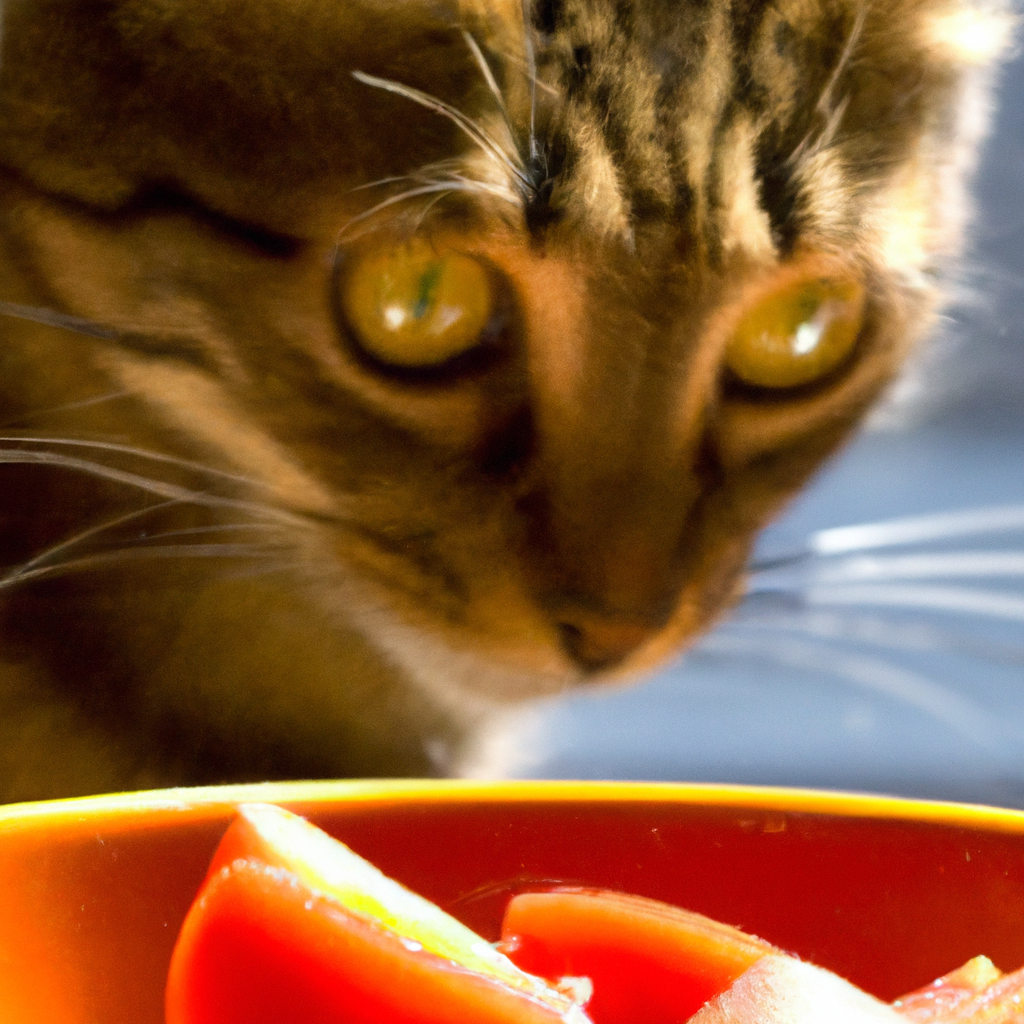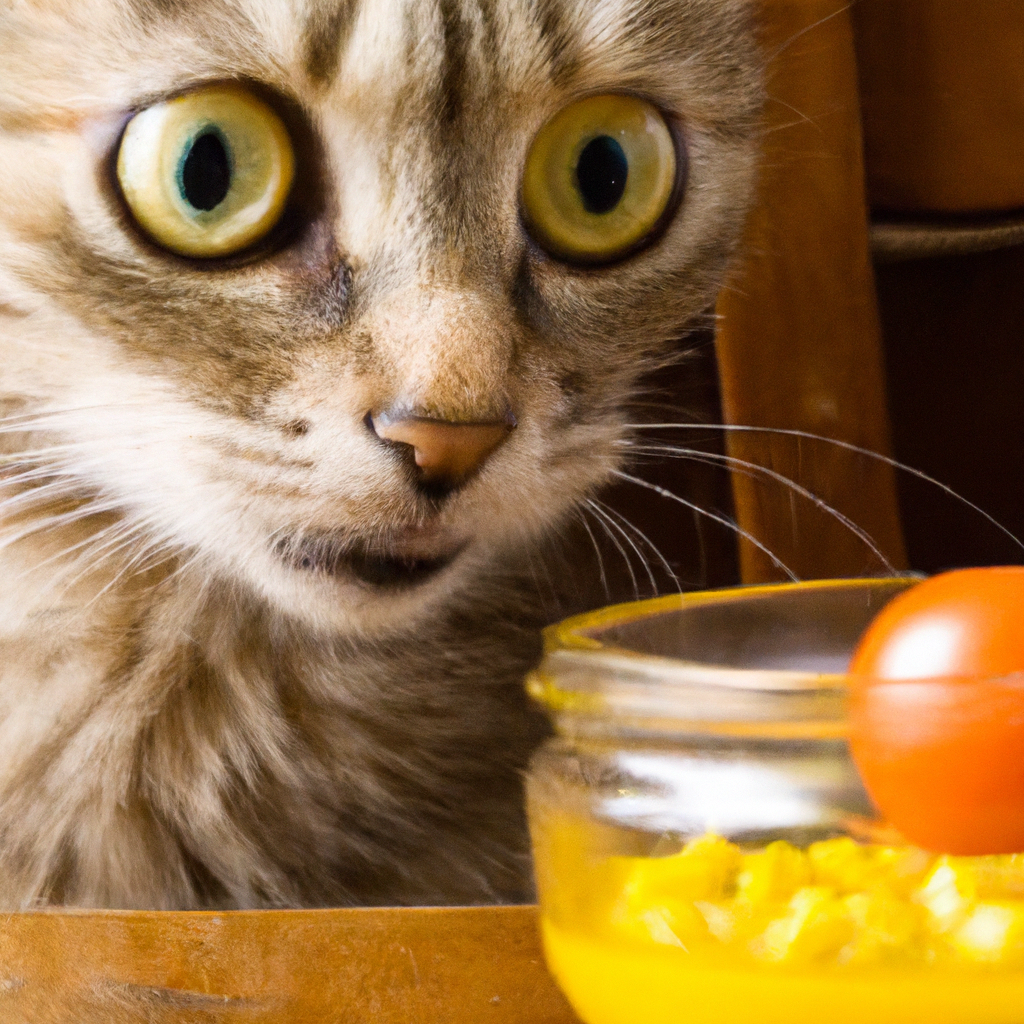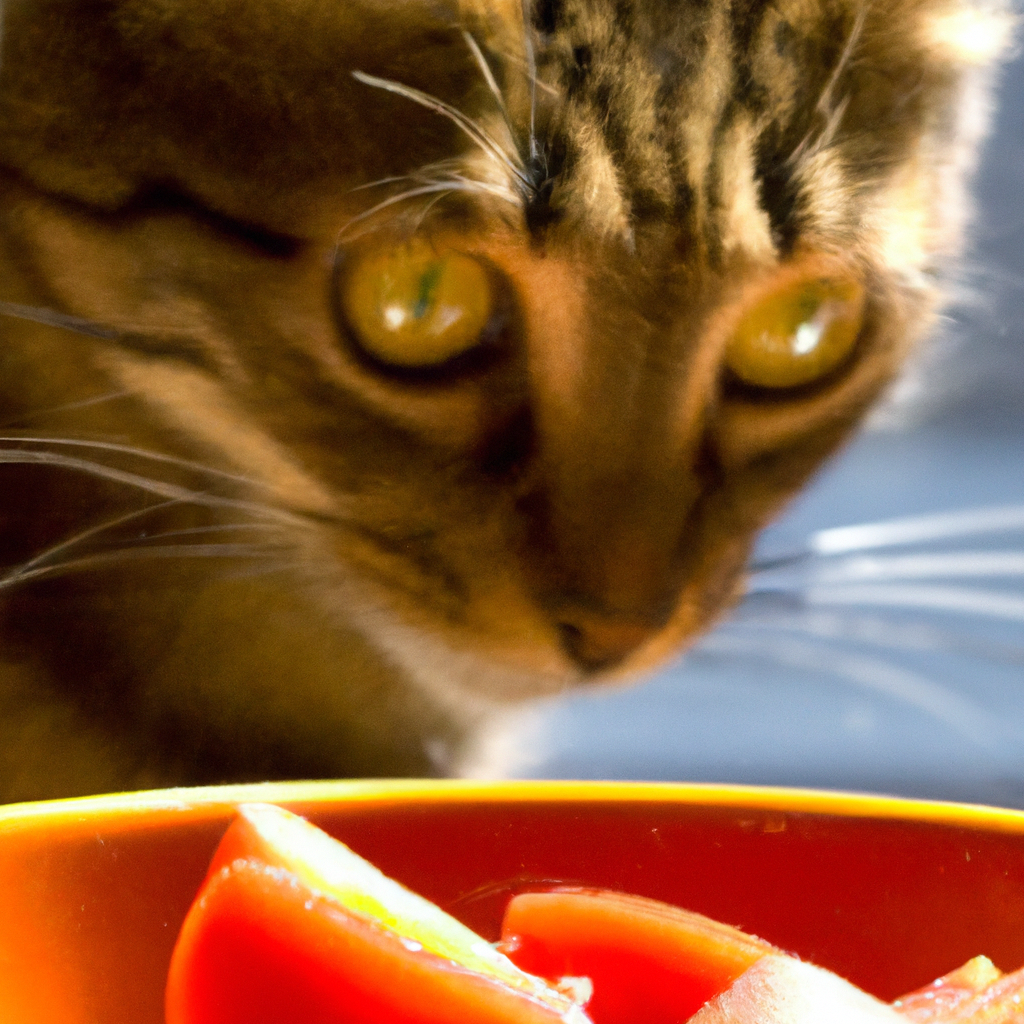Did you know that cats are quite picky eaters when it comes to their food? While they may enjoy their meat-based meals, it’s essential to be aware of what other foods are safe for them to consume. One common question many cat owners have is whether cats can eat tomatoes. Although tomatoes may seem harmless, it’s crucial to understand how they can affect your feline friend’s health before sharing any with them. In this article, we will explore the topic of cats and tomatoes, discussing whether cats can safely enjoy this juicy red fruit or if it’s best to keep it off their menu.


Can Cats Eat Tomatoes
Overview
As a cat owner, you may find yourself wondering whether it’s safe to share some of your favorite human foods with your feline friend. Tomatoes, being a common ingredient in many dishes, may pique your curiosity. While cats are known to have specific dietary needs, it’s important to understand the potential risks and benefits of feeding tomatoes to your furry companion.
Nutritional Value of Tomatoes
Tomatoes are a rich source of various vitamins and minerals, including vitamin C, vitamin K, and potassium. They are also loaded with antioxidants, which can promote overall health and boost the immune system. However, it’s worth noting that cats have different nutritional requirements than humans. While tomatoes offer some nutritional value, they should not serve as a significant part of a cat’s diet.
Benefits of Tomatoes
In small amounts, tomatoes can provide certain benefits to cats. The high water content in tomatoes can help keep your cat hydrated, especially if they do not drink enough water on their own. Additionally, the antioxidants found in tomatoes may have positive effects on the cat’s immune system. However, it’s important to remember that these benefits can be obtained from other, more suitable sources in a cat’s diet.
Potential Dangers of Tomatoes for Cats
While small amounts of tomatoes may have some benefits, they also come with potential dangers for cats. The most significant concern is the presence of solanine, a toxic substance found in the green parts of tomatoes, including the stem and leaves. Consuming large quantities of solanine can lead to various symptoms, such as gastrointestinal upset, weakness, and even paralysis. As a responsible pet owner, it’s crucial to be aware of these risks and take necessary precautions to keep your cat safe.
Feeding Tomatoes to Cats
Small Amounts
If you choose to feed your cat tomatoes, it’s important to do so in moderation. Only offer your cat a small amount of tomato as an occasional treat, rather than a regular part of their diet. This ensures that they receive the potential benefits without exposing them to excessive risks.
Cooked vs. Raw Tomatoes
Cooked tomatoes are generally safer for cats to consume than raw ones. The cooking process helps break down certain compounds that may be harmful to cats. However, it’s essential to remember that tomatoes should still be offered sparingly, even if they are cooked. Always ensure that the tomatoes are cooled down before feeding them to your cat and avoid adding any seasonings or ingredients that could be harmful.
Removal of Seeds and Skin
To further minimize any potential risks, it’s recommended to remove the seeds and skin from tomatoes before offering them to your cat. The skin and seeds contain a higher concentration of solanine, so eliminating these parts reduces the chances of your cat ingesting the toxic substance.
Other Considerations
Before introducing tomatoes into your cat’s diet, consider their overall health, age, and any pre-existing conditions they may have. Kittens, senior cats, and cats with certain health conditions may be more susceptible to adverse effects from consuming tomatoes. Always consult with your veterinarian before making any significant changes to your cat’s diet.
Health Risks and Allergies
Gastrointestinal Upset
One of the most common risks associated with feeding tomatoes to cats is gastrointestinal upset. Cats have sensitive digestive systems, and introducing a new food item, such as tomatoes, can lead to symptoms like vomiting, diarrhea, and stomach discomfort. If your cat shows signs of gastrointestinal upset after consuming tomatoes, it’s best to avoid giving them this particular food in the future.
Allergic Reactions
Cats, like humans, can develop allergies to certain foods. While tomato allergies are relatively rare in cats, they can still occur. Symptoms of an allergic reaction may include itchiness, skin rashes, sneezing, or watery eyes. If you notice any signs of an allergic reaction after feeding your cat tomatoes, it’s important to discontinue their consumption immediately and consult your veterinarian.
Toxicity
As mentioned earlier, certain parts of the tomato plant, such as the stem and leaves, contain solanine, a toxic substance for cats. Ingesting large amounts of solanine can lead to severe toxicity symptoms, including paralysis. Therefore, it’s crucial to prevent your cat from accessing these parts of the tomato plant, whether in your garden or in your home.
Risks for Cats with Health Conditions
Cats with specific health conditions, such as kidney disease or diabetes, may be more susceptible to the potential risks associated with tomatoes. These cats often require specialized diets, and introducing tomatoes, even in small amounts, may disrupt their nutritional balance or exacerbate their condition. Always consult with your veterinarian to ensure the safety of your cat before offering them any new foods.
Alternatives to Tomatoes
Safe Fruits and Vegetables for Cats
If you’re looking to offer your cat a variety of fruits and vegetables as a treat or supplement to their diet, there are several safe options available. Cats can safely consume small amounts of fruits like apples, bananas, and blueberries, as well as vegetables like carrots and cooked green beans. Always introduce new foods gradually and monitor your cat for any adverse reactions.
Cat-Friendly Herbs
In addition to fruits and vegetables, some herbs can serve as a safe and healthy addition to your cat’s diet. Catnip, cat thyme, and valerian root are examples of herbs that cats often enjoy and that can provide certain health benefits. However, it’s crucial to do thorough research and consult your veterinarian before offering any herbs to your cat, as some may have unintended effects or interactions with medication.
Commercial Cat Food
Commercial cat food is specially formulated to meet the nutritional needs of cats. While it may not be as exciting as sharing human food, providing your cat with a balanced and appropriate diet through high-quality cat food is the best way to ensure their long-term health and well-being. If you have concerns about your cat’s diet, consult your veterinarian for guidance on choosing the right commercial cat food for their specific needs.


Summing Up
Moderation is Key
When it comes to feeding tomatoes or any other human food to cats, moderation is key. While tomatoes contain certain nutrients and antioxidants that can be beneficial for cats, they are not an essential part of their diet. Offering tomatoes as an occasional treat, in small amounts, and only after consulting with your veterinarian can help minimize potential risks.
Consult Your Veterinarian
Every cat is unique, and their dietary needs can vary based on factors such as age, health, and individual preferences. To ensure the safety and well-being of your feline companion, it’s crucial to consult with your veterinarian before introducing any new foods into their diet, including tomatoes. Your veterinarian will be able to provide personalized advice and make recommendations based on your cat’s specific needs and health considerations.

